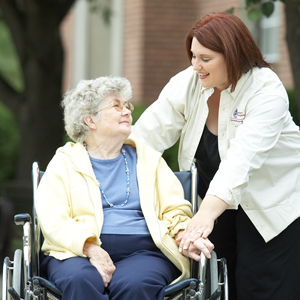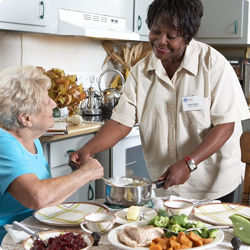What’s Good for Your Heart is Good for Your Brain
Blog | March 2, 2016
Heart disease and stroke are significant health concerns, especially for seniors. The good news is that following a heart-healthy lifestyle also lowers your risk of stroke.
The heart-brain connection
Heart disease and stroke are significant health concerns, especially for seniors. The good news is that following a heart-healthy lifestyle also lowers your risk of stroke. The heart-brain connection Coronary artery disease — the most common type of heart disease — happens when blood flow to the heart is blocked or restricted. Stroke happens when the blood supply to part of the brain is blocked. This means that protecting your heart will also help to protect your brain. High blood pressure and high cholesterol are two key risk factors for heart disease and stroke. Learn more about each one, and steps you can take to lower your risk.
High blood pressure According to the Heart and Stroke Foundation, high blood pressure is the number one risk factor for stroke, and is also a major risk factor for heart disease. High blood pressure happens when your heart has to work harder than normal to pump blood through your blood vessels. Excess sodium consumption increases the risk of high blood pressure. Most of the sodium that Canadians consume comes from processed foods. Stress can also contribute to high blood pressure.
High blood cholesterol Cholesterol is one of the fats in your blood, and your body needs it to produce vitamin D and hormones. Your body (the liver in particular) creates all the cholesterol you need, but cholesterol is also found in certain foods, such as foods from animal fat like butter, cream and meat. High cholesterol can cause a substance called plaque to build up on the artery walls. This build-up makes the arteries narrow, which makes it harder for blood to flow through the body, which increases the risk of heart disease and stroke.
Lifestyle changes You can help protect against high blood pressure and high cholesterol by eating well, and maintaining an active lifestyle. Eating well — by including lots of fresh fruits and vegetables in your diet, and eating foods that are low in fat and sodium — contributes to lowering both blood pressure and cholesterol. It also helps to maintain a healthy body weight. Eat moderate portion sizes, experiment with a variety of colourful fruits and veggies, and choose foods that are high in fibre. To learn more about what’s best for you, consult your doctor, dietician or nutritionist. Being active also helps to reduce blood pressure, and helps to maintain a healthy body weight and reduce stress.
The Heart and Stroke Foundation recommends that adults should accumulate at least 150 minutes of physical activity per week, in bouts of 10 minutes or more. Talk to your doctor before starting any new exercise program. Your doctor can assess whether you have high blood pressure or high cholesterol, and can advise whether you need medication to help to control them. If you are prescribed medication, be sure to take your prescriptions as directed.
Acting FAST Stroke is a medical emergency. Learning the signs of stroke and acting quickly can improve survival and recovery. The Heart and Stroke Foundation has adopted the FAST campaign to educate people about the signs of stroke.
F = Face: Is it drooping?
A = Arms: Can you raise both?
S = Speech: Is it slurred or jumbled?
T = Time: Call 9-1-1 right away.
Knowing how to protect yourself and taking fast action when something happens can improve health outcomes for everyone. Have you taken steps to lower your blood pressure or cholesterol? Share your tips in the comments below! Coronary artery disease — the most common type of heart disease — happens when blood flow to the heart is blocked or restricted. Stroke happens when the blood supply to part of the brain is blocked. This means that protecting your heart will also help to protect your brain.
High blood pressure and high cholesterol are two key risk factors for heart disease and stroke. Learn more about each one, and steps you can take to lower your risk.
High blood pressure
According to the Heart and Stroke Foundation, high blood pressure is the number one risk factor for stroke, and is also a major risk factor for heart disease. High blood pressure happens when your heart has to work harder than normal to pump blood through your blood vessels.
Excess sodium consumption increases the risk of high blood pressure. Most of the sodium that Canadians consume comes from processed foods. Stress can also contribute to high blood pressure.
High blood cholesterol
Cholesterol is one of the fats in your blood, and your body needs it to produce vitamin D and hormones. Your body (the liver in particular) creates all the cholesterol you need, but cholesterol is also found in certain foods, such as foods from animal fat like butter, cream and meat.
High cholesterol can cause a substance called plaque to build up on the artery walls. This build-up makes the arteries narrow, which makes it harder for blood to flow through the body, which increases the risk of heart disease and stroke.
Lifestyle changes
You can help protect against high blood pressure and high cholesterol by eating well, and maintaining an active lifestyle.
Eating well — by including lots of fresh fruits and vegetables in your diet, and eating foods that are low in fat and sodium — contributes to lowering both blood pressure and cholesterol. It also helps to maintain a healthy body weight. Eat moderate portion sizes, experiment with a variety of colourful fruits and veggies, and choose foods that are high in fibre. To learn more about what’s best for you, consult your doctor, dietician or nutritionist.
Being active also helps to reduce blood pressure, and helps to maintain a healthy body weight and reduce stress. The Heart and Stroke Foundation recommends that adults should accumulate at least 150 minutes of physical activity per week, in bouts of 10 minutes or more. Talk to your doctor before starting any new exercise program.
Your doctor can assess whether you have high blood pressure or high cholesterol, and can advise whether you need medication to help to control them. If you are prescribed medication, be sure to take your prescriptions as directed.
Acting FAST
Stroke is a medical emergency. Learning the signs of stroke and acting quickly can improve survival and recovery. The Heart and Stroke Foundation has adopted the FAST campaign to educate people about the signs of stroke.
Knowing how to protect yourself and taking fast action when something happens can improve health outcomes for everyone.
Individualized Home Care Options
Long-Term Home Care, 24 Hour Home Care & Short Term Care Options Customized for You







